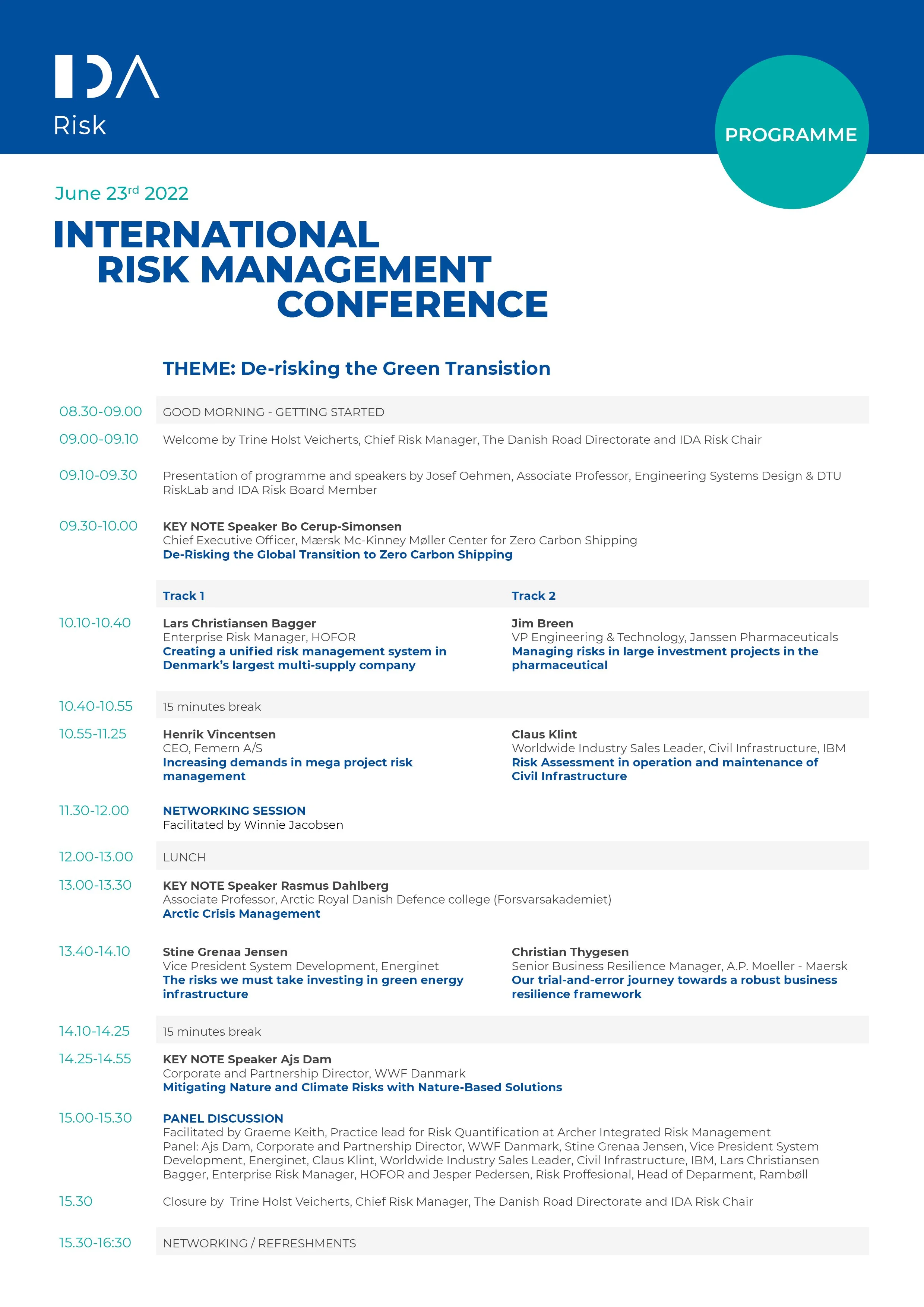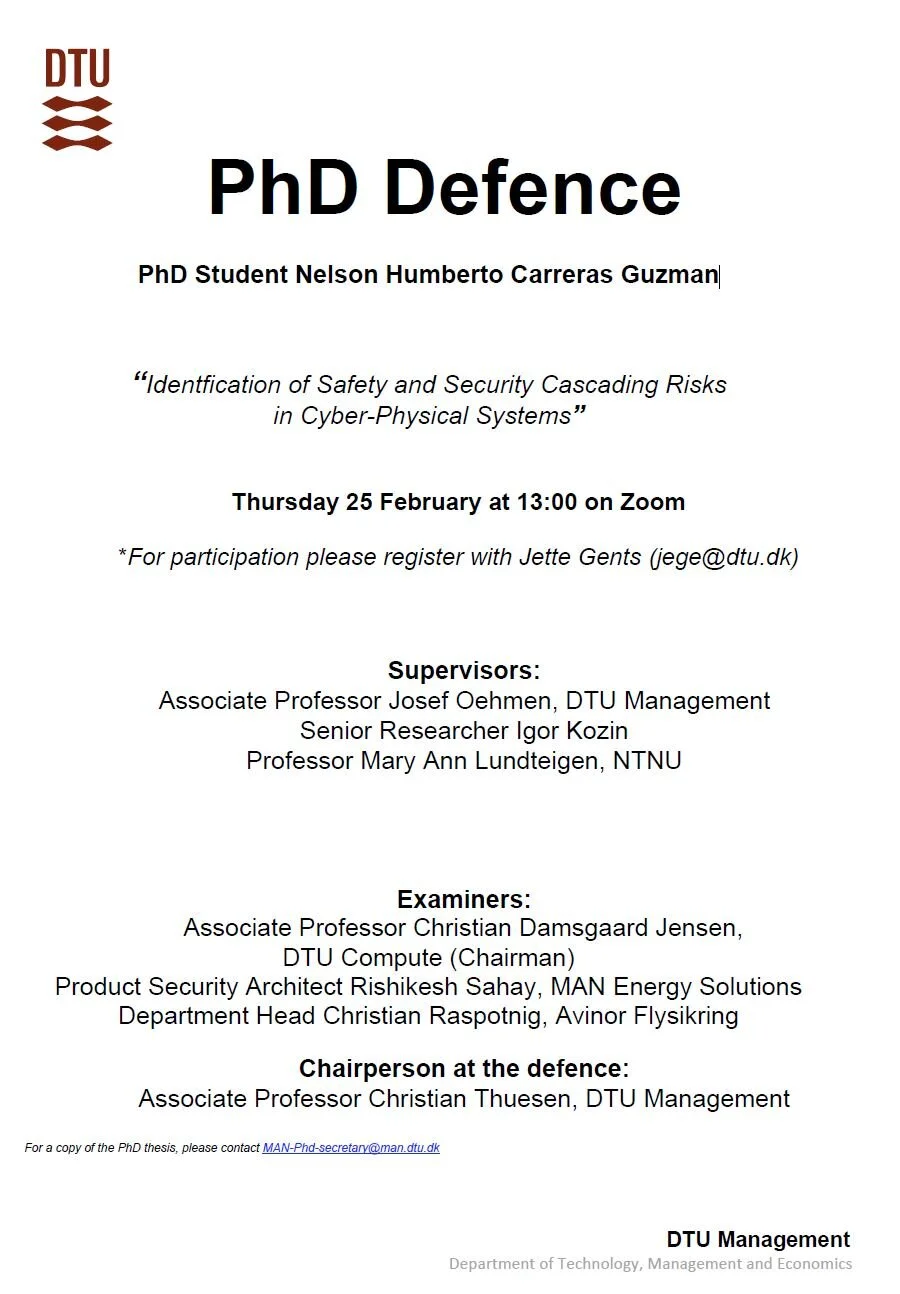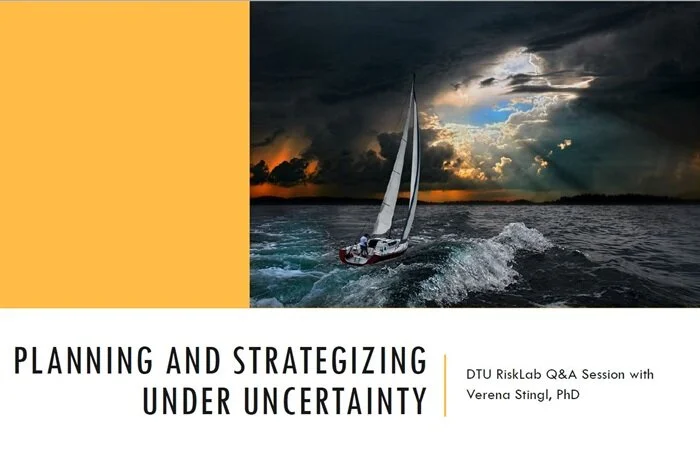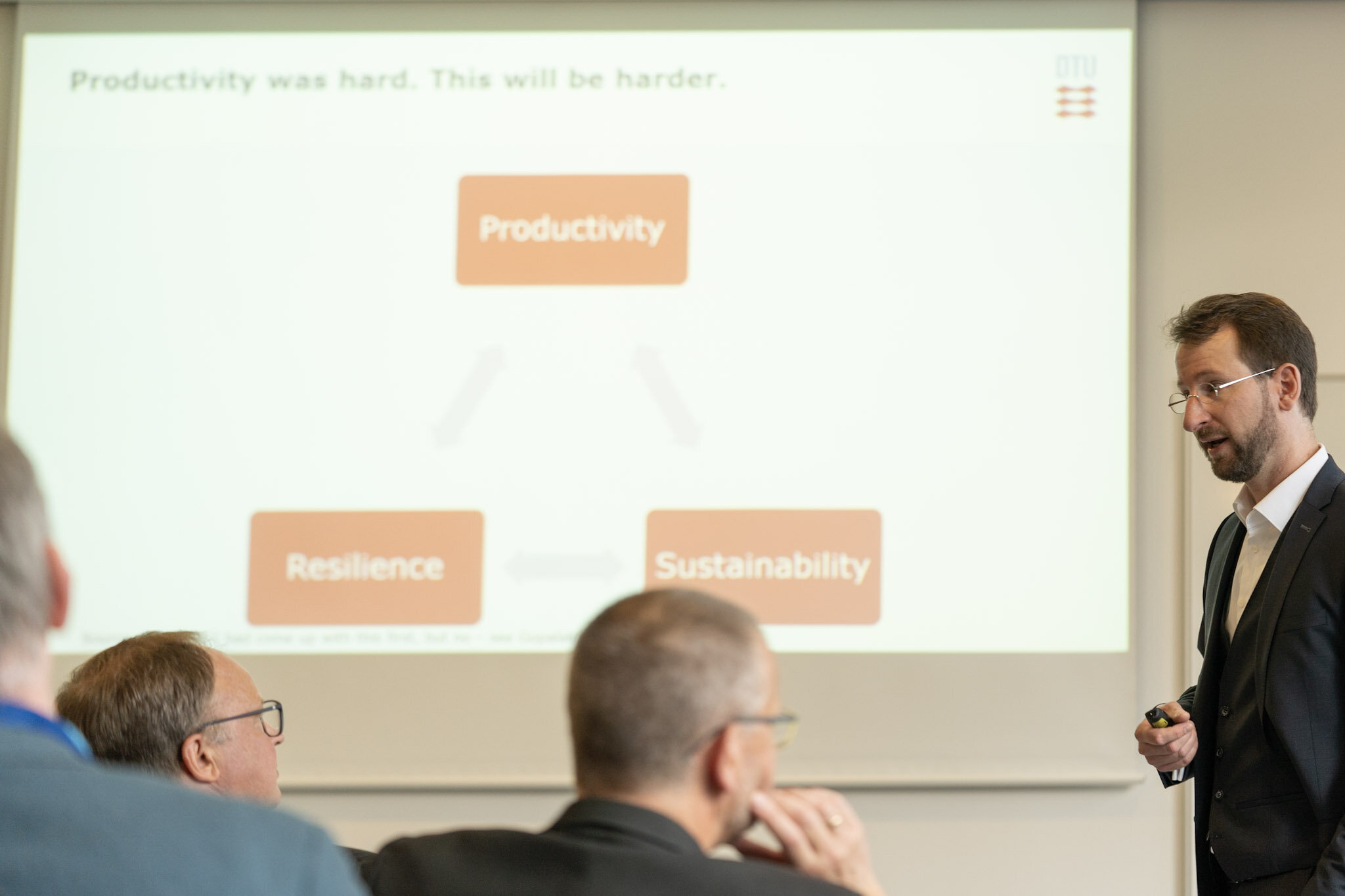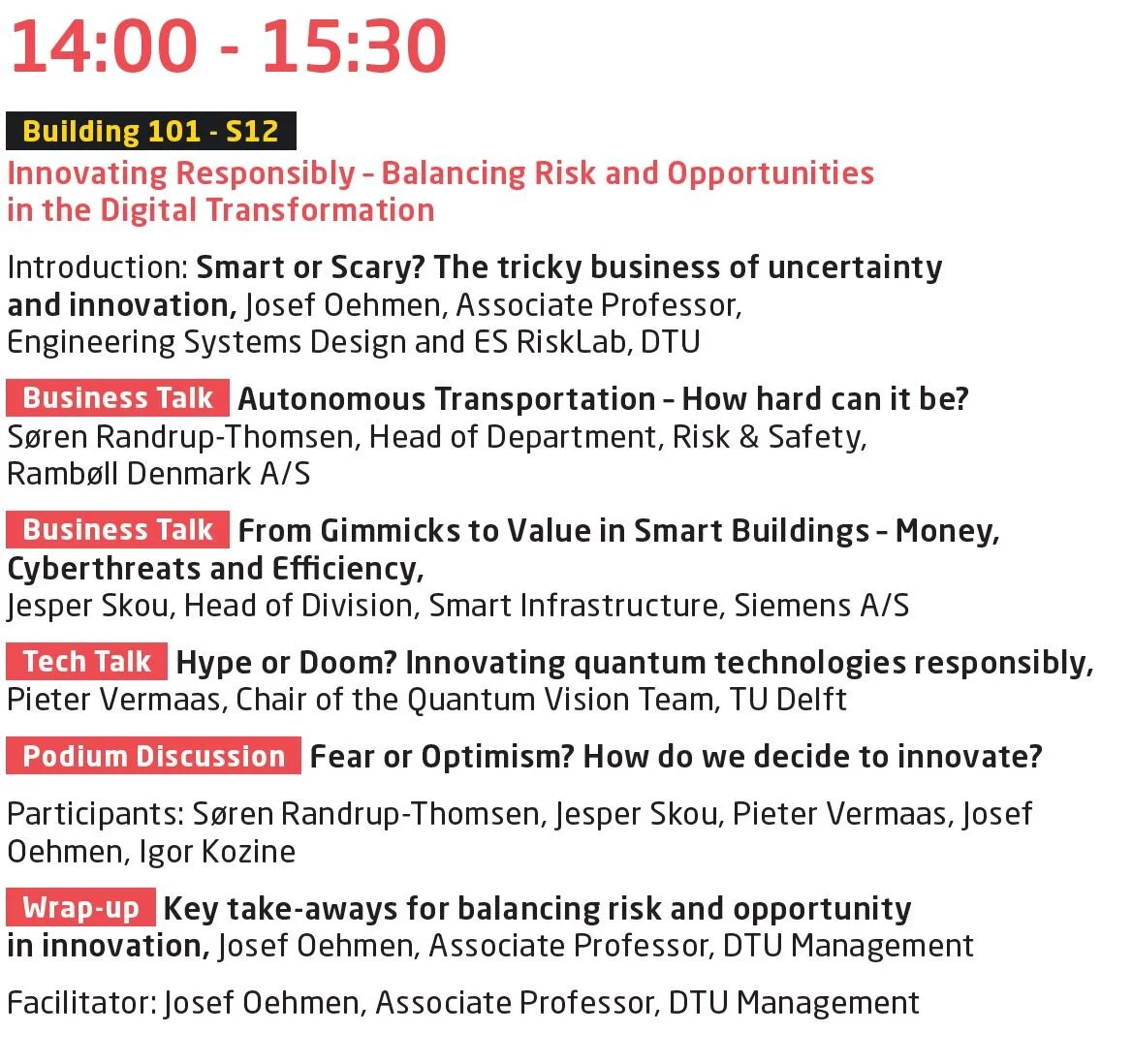
Risk Management for the Sustainable Transformation in the Construction Industry
Værdibyg is organizing an industry and government stakeholder on the theme of risk barriers to the green transition of the construction industry. Cooperation partners are BAT kartellet, Bygherreforeningen, Danske Arkitektvirksomheder, DI Byggeri, Foreningen af Rådgivende Ingeniører and TEKNIQ Arbejdsgiverne).
The event will take place in the “Black Diamond”, the National Library in Copenhagen.
I will be giving a keynote talk titled “Risks in Sustainable Construction: What if… we cannot plan away uncertainty?”
You find more information (in Danish) here: https://vaerdibyg.dk/workshop-gik-i-dybden-med-risikobarrierer/

Concept Program of Norway: Rethinking Cost Risk Management
I will be speaking at the bi-annual Symposium of the Norwegian Concept Program.
The Symposium is invitation-only, but I am happy to share my talk (and all the other material that is presented and produced at the symposium). I will be speaking on some new perspectives on cost risk management, especially the role that adaptability and flexibility can play in bringing down cost overruns and schedule delays.
The Norwegian Concept Program is a fantastic academia - government cooperation, looking to strengthen the project management performance of taxpayer-financed CAPEX projects. Read more about the Concept Program here.

10th DTU Risk Forum: Masterclass on the Human Side of Risk Management
Join us for the 10th DTU Risk Forum, jointly organized by DTU, IDA Risk, and the University of Twente!
Sign up here: Participation numbers are strictly limited to 15 participants from Denmark and the Netherlands each, so we expect this event to “sell out” quick (update: It did, but you are welcome to sign up for the waiting list.)
More information
Climate change, cyber risks, war, supply chain collapses, pandemics: Risk management was never more important for your organization - nor was it more difficult.
This masterclass and workshop will highlight the most important - and most often overlooked - aspect of risk management: The human side beyond the formalized risk management process.
Join us if you want to
Learn about and discuss how to turn every activity in your organization into a risk management activity - not "just" your risk management process.
Learn how to leverage shortcuts and simple rules to make better risk decisions - instead of constantly fighting them with formalized processes.
Hear from Thomas Boye Dyregaard, Head of Global Security & Business Resilience at A.P. Møller - Mærsk A/S about how to prepare your organization for anything - not everything, by reducing bureaucracy and emphaszing the human side of business continuity.
Spend a day with a select group of risk management professionals (15 from the Netherlands, 15 from Denmark) to share experiences and stories
Learn about some of the latest research results in the risk management space.
The day will be facilitated by Prof. Dr. Josef Oehmen (DTU) and Prof. Dr. Verena Stingl (AAU).
Program
08:00: Breakfast snacks and chats
09:00: Welcome
09:20: Industry Impulse Talk + Q&A (1): how to prepare your organization for anything - not everything. (Thomas Boye Dyregaard, Head of Global Security & Business Resilience at A.P. Møller - Mærsk A/S)
10:00: Talk + Discussion: What if... everything is risk management? The best risk management is no risk management (Josef Oehmen & everyone)
10.30: Networking break
10:45: Workshop 1: Re-Thinking Risk Management: Leveraging informal and implicit processes to advance risk management (Group Work, Knowledge Café and Report-Out)
12:15: Lunch
13:00: Talk & Discussion: How humans make decisions under uncertainty, and why we should aim to foster, not fix some of these decision strategies (Verena Stingl & everyone)
13:30: Workshop 2: Putting risk management heuristics to work (Group Work, Knowledge Café and Report-Out)
15:00: Networking Reception
16:00: Program ends
Participation is free of charge for the participants from Denmark. The University of Twente graciously covers all expenses for this event.

Keynote at ICQEM 2022
I will be giving a keynote at the 5th International Conference on Quality Engineering and Management, hosted in Portugal this year. We are all keeping our fingers crossed that we will have a face-to-face conference!
I will be speaking on the relationship of risk management and quality management, and present three lessons learned for quality management in the digital area.
I will update the entry when we have the formal announcement in place! :-)
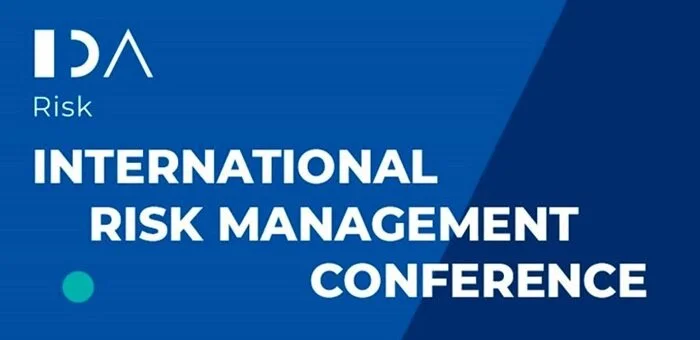
IDA International Risk Management Conference - De-Risking the Green Transition
I have the pleasure again this year of co-organizing and co-hosting IDAs International Risk Management Conference. Do not miss it - the go-to event for engineering and project risk managers in Scandinavia!
We have a fantastic program for you again!
Read all about it here and register today:
https://ida.dk/arrangementer-og-kurser/arrangementer/international-risk-management-conference-34433

Join us at MARESEC 2022
I am on the Program Committee for MARESEC 2022. If you have an interest in the resilience of maritime transportation or energy systems, this is the place to be! We hope to see you there!
You can find more information here: https://dlr.expert/maresec2022/front/index.php
Important dates (at the time of posting):
Abstract Submission Deadline: March 01, 2022
Notification of Acceptance: May 09, 2022
Registration Deadline: June 13, 2022
Conference date: June 20, 2022
Full paper submission Deadline: July 10, 2022

Congratulations Dr. Ali Shafqat!
Today, my PhD student Ali Shafqat successfully defended his PhD thesis at NTNU titled “Managing unplanned design iterations in new product development: An approach using risk management, resilience and organizational learning”.
Ali is one of the few and proud dual-degree PhD students between DTU and NTNU - so he will receive a degree from both organizations.
I am copying the popular science summary below. His thesis will eventually be available through the DTU Libraries.
Congratulations Ali and well done!!!
Popular Science Summary
Most new-product development (NPD) engineering projects encounter uncertainties from rapidly shifting market demands and developing technologies resulting in requirements change and the organization's ability to implement state-of-the-art processes reliably. This complexity triggers unplanned design iterations in the engineering design phase of the NPD process. These unplanned design iterations can be assumed to be the occurrence of a specific class of NPD project risks. Unplanned design iterations ultimately cause failures in reaching cost, schedule, quality, and customer satisfaction targets.
Today's organizations utilize traditional risk management practices to mitigate risks in NPD projects. However, even with mitigation actions in place, projects still struggle to manage NPD project risks.
Therefore, this PhD thesis explored the utilization of risk management, resilience, and organizational learning in managing unplanned design iterations risk in the design and development of new products.
To achieve this aim, we used different research methods including literature review, case study, crosssectional interviews and survey.
The empirical findings of this PhD thesis suggest that risk management processes must be tailored according to the contextual factors of the NPD projects to manage unplanned design iterations. The overlap of risk management-based and resilience-based approaches is required to treat known and unknown NPD project risks that may cause unplanned design iterations. The thesis's findings recommend developing a structured approach for selecting suitable learning methods for managing unplanned design iterations after their occurrence. Finally, the thesis's findings suggest establishing a systematic approach for capturing newly generated knowledge in the resolution of the unplanned design iterations employing organizational learning.

32nd IPMA World Congress: Project Resilience beyond Agile: From bad ideas to best practice
I was invited to speak at the 32nd IPMA World Congress. I will be speaking on the second day. Am copying the abstract of the talk below, hope to see you there!
The conference takes place in St. Petersburg, but is run in a hybrid format. Sign up here: https://ipma2021.world/
Abstract: Project Resilience Beyond Agility – From Bad Ideas to Best Practice
Josef Oehmen, Ph.D., MBA, is an Associate Professor at the Technical University of Denmark (DTU) . His research interests focus on managing large-scale systems engineering programs, particularly on the application of risk management, lean management and the associated organizational strategy processes. He is the founder and coordinator of the Engineering Systems RiskLab at DTU. Prior to DTU, Josef worked at MIT and ETH Zurich where he also obtained his PhD.
He has won numerous awards and scholarships, including regular keynote speaker invitations, teaching awards, the Shingo Prize for his work on Lean Program Management (2013), an appointment as Visiting Professor at the Technical University of Munich (2012), DAU Research Competition Winner (2012), INCOSE collaboration award (2012), a journal paper of the year award (2011), and the research award of the Department for Management, Technology and Economics at the ETH Zurich in 2009.
He co-founded DTU's Engineering Systems Group as well as MIT’s Consortium on Engineering Program Excellence (CEPE), co-chairs the INCOSE Lean Systems Engineering Working Group, and founded and co-chairs the Design Society’s Special Interest Group on Risk Management Processes and Methods.
Josef's current research focuses on developing and implementing paradigm-shifting risk management techniques in the design, construction and operation of Engineering Systems. He works on advanced (non-probabilistic) risk quantification methods, principles of resilient engineering project execution, lean risk management, and risk-based strategy implementation in engineering organizations.
His “academic home” is with the engineering design and operations management community, but the nature of his research is interdisciplinary. In particular, he works on the four related fields risk management; systems engineering program management; lean management; and technology strategy implementation.
In project management, we like to believe that if we only predict the future accurately enough, only plan detailed enough, and only execute disciplined enough, we will be successful. And if we are really professional, we add Agility practices to the mix.
It did not work out last time, but it surely will next time. In a large study of Scandinavian megaprojects, we asked a different question: What happens if we start being honest with ourselves and acknowledge that we will be wrong? I will present 4 take-aways to design resilient project execution models that rely neither on supernatural foresight nor dumb luck for success

9th DTU Risk Forum: Data, Risk, Decisions
We are in the final stages of putting the program together for the 9th DTU Risk Forum, this time in cooperation with IDA Risk and the University of Twente.
We will have a fantastic program for you, featuring industry speakers highlighting their journeys towards a more data-driven risk management, what to do when you just do not have data, and reflecting on how important data really is for decision makers (and how maybe we can make it a bit more important).
We will be joined by 35 risk management professionals from the Netherlands, so this will be a fantastic event.
Here is the link to the full program description & registration. The event is FREE OF CHARGE (thank you, University of Twente, for sponsoring this!!!)

MareSec 2021: Designing Resilient Critical Maritime Infrastructure
The DLR Institute of the Protection of Critical Maritime Infrastructure organized the first European Workshop on Maritime Systems Resilience. It was a fantastic event, bringing together speakers and participants from the European resilience community. The event covered social, organizational and technical subjects.
DTU was present with two papers and talks. One of them was delivered by Josef on “Design for Resilience”, using the integrated safety and security risk identification method UFoIE developed at DTU RiskLab. The UFoI-E method brings three components to the table:
An integrated system representation unifying cyber-, physical-, and cyber-physical elements of critical maritime systems, called the Uncontrolled Flow of Information and Energy Master Diagram (Guzman et al 2020)
An Accident Causation Model, considering cyber-, physical-, and cyber-physical factors (Guzman et al 2019)
A Scenario Builder for “Cyber-Physical Harm Analysis for Safety and Security” (CyPHASS) (Guzman et al 2021)
The core question is how we can leverage this analytical capability not “only” during system design and not “only” for minimizing hazards and vulnerabilities, but also a) throughout the construction and operation phases (in addition to the design phase), and b) for resisting and recovering from disruptions (not only preventing).
How much do we really understand about our safety and security scenarios, if two leading methods overlap by only a third? Source: Guzman et al 2021
One key insight from the talk were the results of our benchmarking of “our” UFoI-E method to identify complex safety-security cascade risks, versus the results obtained with the (more established) STPA-Extension method. Only about one third of the identified scenarios overlapped between the two methods. This raises the question of how confident we can really be in our understanding of critical safety risks in cyber-physical systems.

Wrong, but not failed - What 20 megaprojects taught us about resilience
Invited talk at the IPMA Global Best Practice Week 2021!
Resilience practices for large infrastructure projects
In project management, we like to believe that if we only predict the future accurately enough, only plan detailed enough, and only execute disciplined enough, we will be successful. It did not work out last time, but it surely will next time. In a large study of Scandinavian megaprojects, we asked a different question: What happens if we start being honest with ourselves and acknowledge that we will be wrong? We will be presenting 5 key practices to design resilient project execution models that rely neither on supernatural foresight nor dumb luck for success.
Join us here: https://bpw.ipma.world/
My talk is on the 29th, but the 120 EUR ticket gives you access to all three days. It is a very cool program if you are interested in resilience (really, I am actually officially impressed).

Building Resilient Projects
Invited talk at the Copenhagen Compliance’s Global Risk Management Day.
Please join us here: https://www.copenhagencompliance.com/2021-risk-management-day/agenda/

PhD Defense: Identification of Safety and Security Cascading Risks in Cyber-Physical Systems
Please join us for the PhD Defense of Nelson Humberto Carreras Guzman. For registration details, please see below.
You can find all of Nelson’s publications, including his PhD in a little while, here at the DTU Library.
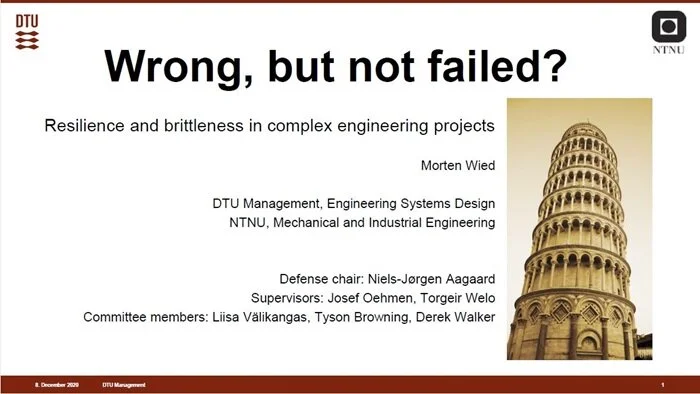
PhD Defense: Wrong, but not failed? Resilience and brittleness in complex engineering projects
Congratulations to Dr. Morten Wied, who today successfully defended his PhD thesis!
Morten today successfully defended his thesis "Wrong, but not failed: Resilience and brittleness in complex engineering projects."
In his thesis, Morten explores three research questions:
What distinguishes resilient from brittle systems, and what are the implications for complex engineering project management?
Why do some complex engineering projects fail, while others succeed, despite, or even because of, unexpected events?
How can complex engineering projects build resilience to unexpected events?
A big thank-you to his examiners Liisa Välikangas (DTU), Tyson Browning (TCU) and Derek Walker (RMIT).
You can find all of Morten's papers here.
Abstract of Mortens thesis:
Most complex engineering projects encounter unexpected events sometime in their life cycle. Effective opposition, economic turbulence, technical problems, partner pull-out, legislative change, new requirements, and early obsolescence are typical ‘plan breakers’. Adding to these are a plethora of oddball happenings, freak accidents, archaeological discoveries, rare natural phenomena, and sometimes malicious sabotage. Such events are common causes of underperformance or failure. Indeed, most complex engineering projects fail to meet the expectations that motivated them.
The traditional solution to this problem has been increasingly sophisticated up-front analysis and planning aimed at ‘de-risking’ projects and ‘de-biasing’ planners. There is little evidence, however, that these efforts have eliminated unexpected events, nor their impact on project performance. While individually unlikely, collectively, unexpected events occur with surprising regularity. This places project management at the horns of a dilemma. On the one hand, the requirement that planners must ‘be right’ about the future for projects succeed seems unattainable, in light of persistent unexpected events. On the other, relying on blind luck seems unacceptable in light of the high stakes involved.
Through the lens of resilient systems theory, this thesis explores an alternative to foresight and luck. This thesis is about the properties allowing some complex engineering projects to resist and recover from unexpected events, without the need to foresee them. Thus, the subject of this thesis is ‘successful failures’, i.e. projects that are ‘wrong, but not failed’. The aim of the thesis is to extend resilient systems theory to complex engineering projects, and, through this lens, explore non-anticipatory solutions to the problem of project planning, selection, and implementation. The investigation is guided by three overarching research questions:
RQ1: What distinguishes resilient from brittle systems, and what are the implications for complex engineering project management?
RQ2: Why do some complex engineering projects fail, while others succeed, despite, or even because of, unexpected events?
RQ3: How can complex engineering projects build resilience to unexpected events?
The three questions are investigated through the literature, retrospective and longitudinal case studies of complex projects, and interviews with experienced project managers.
In answer to the first question (RQ1), the thesis extends resilient systems theory to complex engineering project management. In doing so, the thesis challenges a paradigmatic assumption of traditional project management; that information precedes action. In most complex systems, this assumption does not hold. Rather, the most critical information typically surfaces through implementation and operation – not up-front analysis and planning. In actuality, action often precedes information. Indeed, action is often a prerequisite for dislodging information. This makes implementation and operation the primary information-producing processes. Paradoxically, the minimum requirement for learning the outcome of most complex engineering projects, is to implement them. Through the lens of resilience theory, the problem of unexpected events is thus reframed from one of inaccurate foresight to one of unrecognised ignorance, and the solution from one of improved foresight to one of general preparedness. Offering an alternative to foresight and luck, extended resilience theory delineates a ‘non-anticipatory’ paradigm of project management. It suggests that some projects have shared properties allowing them to resist and recover from unexpected events, without the need to foresee them. This shifts the emphasis of project management research from projects that are ‘right and successful’ or ‘wrong and failed’ to project that are ‘wrong, but not failed’.
In answer to the second question (RQ2), the thesis investigates the relationship between unexpected events and project performance in a range of real-world projects. The thesis finds that unexpected events cause projects to fail when projects lose superiority over competing alternatives foregone by their implementation, in the eyes of their stakeholders. Conversely, projects succeed despite or because of such events when they retain or regain such superiority. Thus, the thesis develops an essentially ‘opportunity cost’ view of project performance, finding formal performance criteria neither necessary nor sufficient for project success. On this basis, the thesis identifies a set of shared properties of ‘resilient projects’ able to succeed despite, or because of, unexpected events. Conversely, the thesis identifies properties of ‘brittle projects’, dependent on planners ‘being right’ about the future, or simply lucky. Departing from the traditional emphasis on the quality of plans and planners, these findings emphasise key characteristics of projects themselves.
In answer to the third question (RQ3), the thesis prescribes a combination of Socratic humility about the future and an ethos of ‘prudent action’. Through the lens of resilience theory, the emphasis of project management falls on action rather than information, i.e. on what we do rather than what we know. In this light, the properties of brittle projects function as diagnostic markers – warning signs of success-dependence on foresight or luck. Conversely, the properties of resilient projects offers a menu of possibilities for building resilience. Based on these, the thesis sets out practical prescriptions for building project resilience and discusses their implications for project planning, selection, and implementation.
The thesis makes six main contributes to the knowledge base on complex engineering project management – two corresponding to each research question: In answer to RQ1, the thesis develops a framework for analysing resilience and brittleness (C1), and develops a typology of resilient systems across disciplines and application domains (C2). In answer to RQ2, the thesis develops an opportunity cost view of project performance (C3), and identifies properties distinguishing projects able to succeed despite, or because of, unexpected events from projects which cannot (C4). In answer to RQ3, the thesis identifies a repertoire of approaches to managing uncertain projects across a range of industries and project types (C5), and outlines adaptation, acceptance and positioning as a principal solution space for building resilience to unexpected events (C6).
Overall, the thesis provides an alternative perspective on both the problem and the solution consistently poor performance of complex engineering projects, and raises a new set of questions for project planning, selection, and implementation. Prescriptively, the thesis emphasises preparedness over prediction, and prudent action over accurate information. Fundamentally, the message of the thesis is that we do not need to know the future to act wisely, but pretending to know the future when we do not, causes us to act foolishly.
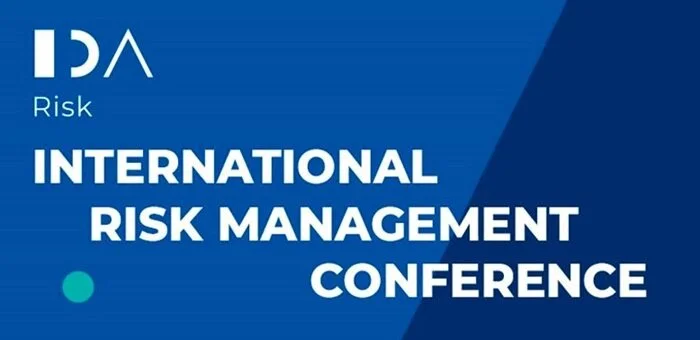
7th IDA International Risk Management Conference
You missed the conference? You are in luck, see below!
Josef from DTUs RiskLab is co-organizing this years IDA International Risk Management Conference. It is Denmark’s premier risk management event, do not miss it! We have an all-star lineup for you!
Join us here: https://ida.dk/viden-og-netvaerk/netvaerk-oversigt/sikkerhed-brand-og-risiko/ida-risk
Have a look at the program below!
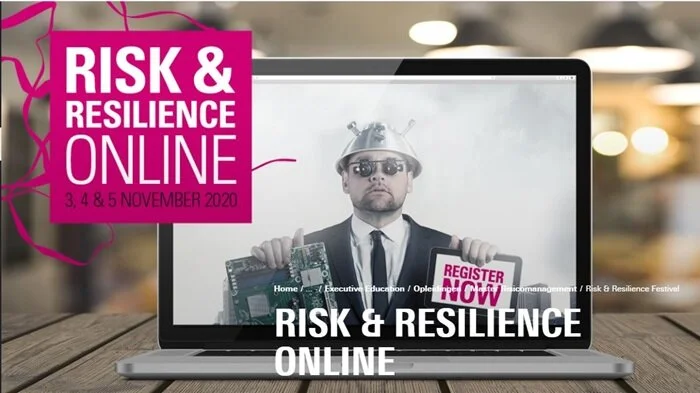
Keynote at the Risk & Resilience Festival of the University of Twente
Josef delivers a keynote on "risk as a feeling" and its impact on resilience management at this years Risk & Resilience Festival at the University of Twente, followed by a panel discussion. In particular, the talk will focus on how risk perception impacts our efforts to effectively combat the COVID-19 epidemic.
The risk and resilience festival is a fun annual event, if you are not on their mailing list, check it out here: https://www.utwente.nl/onderwijs/professional-learning-and-development/executive_opleidingen/master-risicomanagement/risk-and-resilience-festival/
The festival connects graduate level students and risk management professionals, and offers exciting content for both!
P.S.: This is how one of the participants summarized my talk. Maybe I didn’t need so many slides???
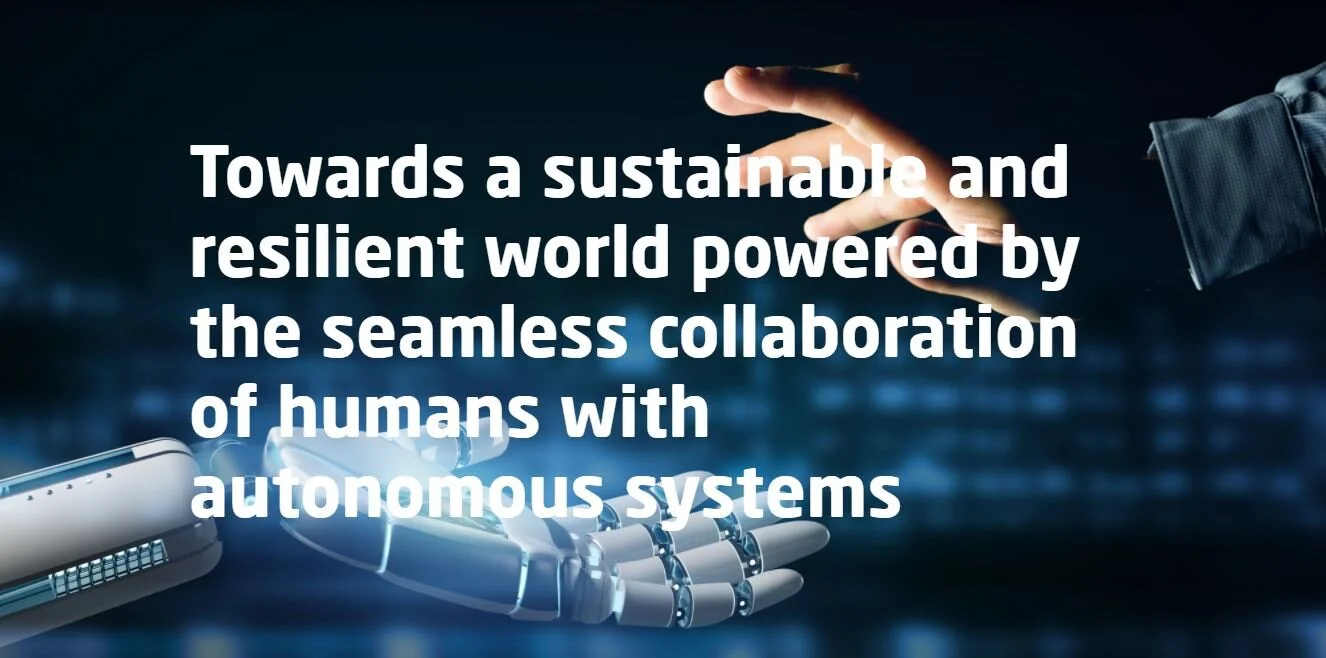
Keynote at Opening of DTU's Center for Collaborative Autonomous Systems
Smart systems are good, smart resilient systems are much better!

RiskLab Q&A - Planning under uncertainty
DTU RiskLab holds online Q&A with Dr. Verena Stingl for industry executives around topics of planning and strategizing under uncertainty
We brought together 20 industry executives for an impluse talk by Dr. Verena Stingl around questions of better planning and strategizing under conditions of significant uncertainty, as they are currently imposed on us by the COVID-19 pandemic.
Verena introduced concepts such as moving from "predict and plan" to "monitor and react", simple rules to structure decision making boundaries, and using story-telling for scenario development and planning. Her impulse talk was followed by lively Q&A session and discussion.

8th DTU Risk Forum - Resilience Roundtable
The 8th DTU RiskForum was moved online to discuss the application of risk and resilience thinking to handle current COVID-19 disruptions.
Follwing a 15-minute impulse talk by Josef, we had a lively hour-long Q&A and moderated discussion among industry practitioners.
The key focus areas were working with multiple plausible future scenarios, navigating the two extremes of panic and complacency, and leadership in uncertain times.

7th DTU Risk Forum: Digitalization - Smart or Scary?
7th DTU Risk Forum: “Digitalization – Smart or Scary?”
To register for the Risk Forum click here.
The Risk Forum is a format that brings together risk practitioners from industry, government and academia. We explore, debate and share experiences on current hot topics in risk management.
The Forums are organized around three main elements: Short impulse talks by leading experts in the field, interactive workshops, and networking opportunities.
The 7th Risk Forum will be held in conjunction with the 5th SRA Nordic Conference on November 8, 2019 in Copenhagen. The topic will be “Digitalization – Smart or Scary?”. Together, we will explore three major themes in this context:
Development speed and smart system reliability: What are the implications of the vastly different innovation cycles and technological maturity that make up our complex cyber-physical systems, from autonomous cars to smart buildings? How can we safety-certify systems where critical components are under constant development, for example safety-critical autonomous systems?
Project and strategy risks of smart systems: How can we better support project managers and senior executives in managing innovation projects that focus on digital innovation? How can we ensure that our risk and resilience management techniques span the technical, project and strategy space?
Regulating perceived risks and benefits of smart systems: How do we account for risk (and benefits) perception in regulating “smart” systems, as well as the uneven distribution of their risks and benefits? How do we trade-off the additional benefits with the additional vulnerabilities we introduce?
Each topic will be introduced by an impulse talk of an internationally leading expert, followed by a workshop and experience exchange of the participants.
Program
08:30 Registration
09:00 Program start: Welcome & Introduction to Risk, Responsibility and Innovation for Smart Systems
09:30 Impulse Talk #1 – Reliability of Smart Systems: Safety-Certifying Smart Systems for Railways - What works and what doesn't - Stig Munck,Rambøll Danmark A/S
10:00 Workshop Part #1 – “Experience Speed Dating” and reflection in group: The challenges of smart system reliability and fast innovation cycles
11:00 Impulse talk #2 – Smart Systems, Smart Project , Smart Strategy? Opportunities and risks of a 'smart business' - Claus Klint , Director Internet of Things, IBM Denmark
11:30 Lunch and Networking
12:15 Workshop Part #2 – 1 on 1 discussions and reflection in group: Project and Strategy Risk Management Approaches for Smart Systems
13:00 Impulse Talk #3 – Communicating and Discussing Digitalization Risks and Benefits - The Societal Perspective. Prof. Dr. Maja Horst, DTU
13:45 Coffee break
14:00 Workshop Part #3 – Table workshops and report out: Expectations and gaps in smart system risk regulation and perception
14:45 Wrap-up
15:00 Keynote: J. R. Taylor, Innovation Failures and How to Avoid Them
15:30 Closing ceremony
15:40 Networking reception (and light dinner)
16.30 End of day

5th SRA Nordic Conference 2019
DTU RiskLab hosts the 2019 SRA Nordic Conference.
The Nordic Chapter of the Society for Risk Analysis (SRA Nordic) invites you to its 5th conference that will be held in Copenhagen.
The objective of the SRA Nordic 2019 conference is to provide a multi-disciplinary forum for the exchange of knowledge and expertise on theories, methods and practices in the field of risk management within the Nordic and Baltic countries (Denmark (incl. Greenland), Faroe Islands, Finland, Norway, Sweden, Iceland, Latvia, Lithuania, and Estonia).
The witnessed profound and rapid technological changes come with their negative and often pervasive and not fully understood effects. Any new technology making use of digitalisation, new materials, environmental technologies, etc., comes with new risks. Innovation may impact fields beyond the obvious primary areas of harm, introducing new, yet potentially unknown, hazards and risks.
Clearly, there is a strong need for coping with these challenges by all available and yet being developed means of risk management including the involvement of all affected parties.
The conference will bring together the Nordic and Baltic research community on Risk Analysis of innovative products and technologies. The target audience are academics and practitioners interested in the assessment, characterization, communication, management and policy of the risks connected to innovation, such as risk to human health, the environment and other. The conference will be the breeding ground for student participants. Events such as a poster session and career development opportunities will enable student participants to build a strong network within the community.
The Risk Forum and Workshops are special events scheduled on the second day of the conference, 8 November.
Contribution types: abstract and posters. Abstracts for oral and poster presentations as well as workshops must be prepared by using the provided templates.
Conference proceedings: The book of abstracts will be published.
Venue: IDA Conference Center, Kalvebod Brygge 31-33 I 1780, Copenhagen V.
Contact Information
For further information please contact us at SRA_Nordic_2019@man.dtu.dk.
Program
08:30 Registration
09:00 Conference opening by chair I. Kozine
09:10 Welcome by DTU's dean of research K. K. Andersen
RISK AND INNOVATION DIALOGUE (Plenary)
09:30 Keynote: S. Berg, No pain - no gain
10:10 Keynote: M.-V. Florin, Addressing the
Tensions Between Precaution and Innovation
10:50 Coffee break
11:10 Expert panel: Risk and Innovation
12:00 Lunch
12:45 Session 1
Room
Chair Track 1: Artificial Intelligence and Risk Analysis Room 101 R. Taylor Track 2: Risk Analysis of Cyber-Physical Systems Room 102 N. C. Guzman Track 3: Risk Perception and Communication Room 208
A. Balzekiene
14:00Coffee break
14:15 Session 2
Room Chair Track 4: Risk Analysis of Cyber-Physical Systems Room 101 J. Zhang Track 5: Risk Management for Organisations Room102 J. Oehmen Track 6: Software Tools for Risk Analysis Room 208 N. J. Duijm Track 7: Risk Analysis for Critical Infrastructure Room212 S. H. Jore
15:30 Coffee break
15:45 Session 3
Room Chair Track 8: Risk Management for Organisations Room 101 Track 9: Uncertainty Assessment Room 102 I. Kozine Track 10: Learning from Accidents and Regulatory Practices Room 208 F. H. Hedlund Track 11: Issues of Digitalisation Room 212 M. Ylönen
17:00 Dinner
18:00 SRA Nordic Chapter Board meeting
RiskLab at DTU High Tech Summit: Innovating Responsibly
The RiskLab is running a track at DTU’s premier event, the DTU High Tech Summit!
Our topic is “Innovating Responsibly - Balancing Opportunities and Risk in the Digital Transformation”
Join us at the link above! The entire program is very interesting (and of course Josef’s talk in particular!)

6th DTU Risk Forum: The Power of Resilience
The 6th RiskLab Forum was a huge, sold-out success with over 50 participants
Over 50 participants from 4 countries spend a day together to explore the theme of creating resilient organizations and better managing surprises.
We presented findings and prototyped a workshop format developed as part of the DTU-Brightline cooperation on better dealing with strategically relevant surprises.
The main themes were:
Understanding the different types of surprises an organization faces
Discussing the organizational journey understanding and (eventually) agreeing on the type and magnitude of the disruption and finally
Strategies, enablers and blockers to dealing with surprises.
One of the main take-aways for the participants was that we need to drastically reduce the time between the occurence of a fast- or slow-moving surprise, and the organization taking decisive action.
During the day, three industry experts contributed their viewpoints through impulse talks:
Lars Eriksen, Senior Director at Novo Nordisk and head of the Investment Project Office
Søren Jacobsen, Nobina Danmark
Lars Frisk, Chief Consultant Risk & Safety at Rambøll
A big thank-you to the co-organizers and supporters of the event: IDA Risk, Brightline, PMI and the University of Twente.
5th DTU Risk Forum: Technology Readiness Levels
Prof. Alison Olechowski (MIT / U Toronto) is visiting us. She is an all-around fabulous person and will give a seminar on her TRL-related research. I am providing the abstract below.
Please register by emailing jooehm@dtu.dk, so I can add you to the Outlook meeting invite (and you will receive an update in case the room changes etc.)
Read more about Alison here: https://www.mie.utoronto.ca/mie/faculty/olechowski
Technology Readiness Levels – Uses, Challenges, Solutions
Presentation followed by discussion
Many of today's highly innovative products and systems are built around new technologies. These technologies can enable operation in extreme environments, and can lead to the introduction of radically new products to open whole new product categories. Given this potential upside of new technologies, a huge amount of engineering resources is spent on R&D and technology development activities to progress the readiness of technological ideas to the point where they are embodied in a component that can be incorporated into a new product or system.
In this talk, Alison will present an investigation, assessment and discussion of the challenges of modern use of the technology readiness level (TRL) method, a tool commonly used during engineering technology development to measure technology maturity. She will present evidence collected via semi-structured interviews with and a survey of TRL practitioners in industry, identifying challenges of implementation. These challenges relate to decision-making, leadership and project management among other things. Challenges related to system complexity were found to be most critical to TRL users. Alison will present new solutions to address a number of these challenges, and discuss directions for future research to tackle more.

6th IDA International Risk Management Conference
On May 16, the 6th International Risk Management Conference will be hosted by IDA.
It is the must-go event for risk managers in Scandinavia, and we hope to see you there!
The RiskLab is helping with the organization and some of the talks! ;-)
Early bird registration closes April 1, so get your ticket now.
You can find more information, the conference program and register at the following link:
https://ida.dk/arrangementer-og-kurser/konferencer/international-risk-management-conference

4th DTU Risk Forum - Risk Powers Strategy
How risk powers strategy: 4th Project Risk Forum
This edition of Project Risk Forum will explore how risk management enables successful strategy initiatives and implementation. We will be discussing strategy implementation and risks according to different innovation types and invite people from different organizations and levels. Doing strategy is risky – new technologies, new markets, and new internal capabilities are created. Effective project risk management allows strategy projects to manage these types of uncertainty, and helps leadership teams deliver. On the other hand, failure to manage strategy implementation risks causes significant financial losses – directly and as opportunity costs.
What is the best way for risk management to enable strategy & innovation? – Join us for an exciting day about risk management, strategy and innovation.
Program
09.00 Registration & light breakfast snacks
10.00 Welcome & introduction
10.05 Intro to Strategy Portfolio Framework by Josef Oehmen
10.25 1 on 1 discussion on strategy implementation experiences
10.35 Impulse talk - Carsten Toft Boesen, CEO, NIRAS
10.55 Impulse talk - Graeme Keith, former head of strategy & enterprise
risk management, Mærsk Oil
11.15 Exercise #1 - map out strategy projects
12.00 - Lunch
12.55 Impulse talk - Claus Klint, Director, Internet of Things, IBM Danmark
13.20 Impulse talk - Sune B. Krings, Senior Manager, PwC Danmark,
13.40 Impulse talk - Poul Skadhede, Group CEO, Valcon
14.00 - Coffee and sweets
14.10 Exercise #2 - explore new opportunities
15.00 Exercise #3 - reflect on action items
15.30 Wrap-up
16.00 End of day

3rd DTU Risk Forum - Smart Safety
Smart safety: 3rd Project Risk Forum
We witness significant developments in the area of smart cyber – physical systems, for example autonomous driving; smart buildings, cities, and critical infrastructure; smart, collaborative robots and other advanced production systems. They are typically seen as very important, strategically relevant projects. However, these developments pose qualitatively new challenges for risk and safety management, not least in the four areas:
Safety certification protocols
Implementation and management of these strategic, but high-risk projects in practice
Engagement of regulators and the general public on safety standards
Specific risk management methods for identification, assessment and mitigation of “smart system risks”
Program
9:00 Light Breakfast Snacks
10:00 Welcome and introduction
10:10 Workshop 1:
1 on 1 discussion: personal work and research priorities
10:30 Impulse Talk 1:
Igor Kozine – “Resilience vs. Smartness”
10:45 Impulse Talk 2:
Robert Taylor – “Emergent Hazards in IoT”
11:00 Coffee Break
11:15 Workshop 2:
Knowledge Café Part 1: Certification, Regulations, Project
Management and Methods for Smart Safety
12:15 Lunch
13:15 Workshop 3:
Knowledge Café Part 2: Report-out and discussion
14:00 Workshop 4:
Open Space – Teaching, Publishing, Proposals & PhD Ecosystem
15:30 Wrap-up and next steps
16:00 Event ends

2nd DTU Risk Forum - The Value of Risk Management
We bring people together that are interested in improving project risk management. The focus of this edition is to explore the different needs stakeholders have in relation to risk management at different levels of the organisation and how they can be implemented in the project and risk management activities.
Program
Registration & light breakfast.. . . . . . . . . . . . . . . . . . . . . . . . . . . . . . . . . . 09:00
Welcome & introduction.. . . . . . . . . . . . . . . . . . . . . . . . . . . . . . . . . . . . . . . 10:00
Industry key note: Søren Randrup-Thomsen,
Head of Department, Risk and Safety, Rambøll.. . . . . . . . . . . . . . . . . 10:15
1-on-1: Share best practices on quantifying risk .. . . . . . . . . . . . . . . . 10:45
Break.. . . . . . . . . . . . . . . . . . . . . . . . . . . . . . . . . . . . . . . . . . . . . . . . . . . . . . . . . . 11:15
Knowledge café: The value of risk management.. . . . . . . . . . . . . . . . 11:30
Lunch. . . . . . . . . . . . . . . . . . . . . . . . . . . . . . . . . . . . . . . . . . . . . . . . . . . . . . . . . . 12:30
Knowledge café: Report out.. . . . . . . . . . . . . . . . . . . . . . . . . . . . . . . . . . . . 13:30
Industry key note: Jannik Iversen, Aarsleff A/S.. . . . . . . . . . . . . . . . . . 14:00
Break.. . . . . . . . . . . . . . . . . . . . . . . . . . . . . . . . . . . . . . . . . . . . . . . . . . . . . . . . . . 14:30
Table workshop: Risk value stream mapping. . . . . . . . . . . . . . . . . . . . 14:45
Wrap-up: Actionable insights & engagement opportunities.. . . . . 15:45

1st DTU Risk Forum - Risk Quantification
First DTU Project Risk Forum broke all expectations with almost 50 industry participants. It was held at DTU and organized in cooperation with NTNU, the Nordic 5 Tech Alliance, and PMI Denmark on May 22nd.
The theme of the day was "Risk Quantification", and it was explored through a mix of impulse talks and interactive workshops - "the perfect program" in the words of one participant. We are looking forward to the next event in October / November: "Maximizing the Value of Project Risk Management."
The impulse talks covered subjects such as “Confidence and Optimism in Oil and Gas Exploration” (Graeme Keith, Maersk Oil), “Agile Risk Management” (Keel Normann Andersen, Novo Nordisk), or “Practical Approach to Project Cost Risk Management” (Karim Cedric Meaouia, NIRAS). The interactive workshops offered 1-on-1 interaction opportunities, a Knowledge Café on selected risk quantification challenges, as well as an exercise developing business value propositions for improved risk quantification.
Program
Registration & light breakfast...................................09:00
Welcome & introduction........................................09:30
1-on-1: Share best practices on quantifying risk .................09:45
Key Note: Confidence versus optimism in hydrocarbon exploration
Graeme Keith, Head of enterprise risk management,
Lead strategy advisor, Mærsk Oil & Gas.........................10:15
Break...........................................................10:35
Knowledge café: Uncertainty in decision making................10:50
Break...........................................................12:30
Managing technical risk in PD of an automotive supplier,
Professor Torgeir Welo, NTNU..................................13:30
Key Note: Agile risk management, Keel Norman Andersen,
Head of project project controls, Novo Nordisk..................13:45
Table workshop: Risk quantification business pitch..............14:00
Break...........................................................14:30
Table Presentations.............................................14:45
Key note: Cost-risk management, Karim Meaouia,
Commercial client advisor, NIRAS...............................15:15
Key note: Trends in uncertainty management
Josef Oehmen & Miroslava Tegeltija, DTU........................15:30
Actionable insights & engagement opportunities................15:45
